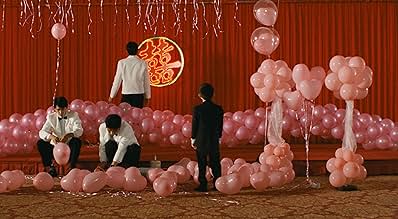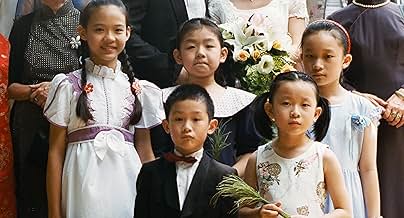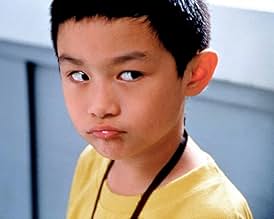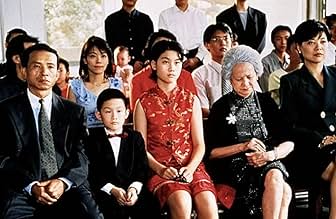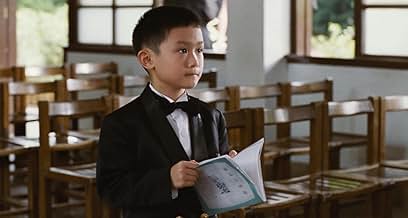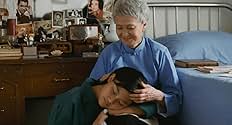Yi yi
- 2000
- Tous publics
- 2h 53min
Portrait d'une famille de la classe moyenne de Taipei. Un homme d'une quarantaine d'années, sa fille adolescente et son fils de huit ans naviguent entre remords, espoir et déception.Portrait d'une famille de la classe moyenne de Taipei. Un homme d'une quarantaine d'années, sa fille adolescente et son fils de huit ans naviguent entre remords, espoir et déception.Portrait d'une famille de la classe moyenne de Taipei. Un homme d'une quarantaine d'années, sa fille adolescente et son fils de huit ans naviguent entre remords, espoir et déception.
- Réalisation
- Scénario
- Casting principal
- Récompenses
- 14 victoires et 23 nominations au total
- N.J.
- (as Nianzhen Wu)
- A-Di
- (as Xisheng Chen)
- Sherry Chang-Breitner
- (as Suyun Ke)
- Dada
- (as Michael Tao)
- Xiao-Yan
- (as Shushen Xiao)
- Lili
- (as Adrian Lin)
- Pangzi
- (as Yupang Chang)
- Grandma
- (as Ruyun Tang)
- Mrs. Jiang
- (as Shuyuan Xu)
- Yunyun
- (as Xinyi Zeng)
- Migo
- (as Yungfeng Li)
- Nancy
- (as Shihui Jin)
- Shu Ge
- (as Guozhi Shu)
Avis à la une
Losing director Edward Lang recently (he died in 2007) was hard on the film world in general, as well as on Chinese language films with an international reach. And "Yi Yi" is a great, offbeat and yet accessible, likable film. What happens is very simple--an extended family is portrayed over several months as they enter relationships and life takes its usual tragic-comic toll. In a way, nothing in particular happens. There is no grand focus to the film in the usual sense (a murder, a love affair, a business deal gone wrong) but instead all of these things happen and overlap.
Some viewers will surely find it too dull and slow to withstand, but most viewers (the majority) once you give it a chance, will find the humanity bracing, the honesty of the acting and the writing (also by Lang) alive and well. It is filmed with straight forward storytelling expertise, but it is paced and edited with a higher order of intelligence. The sequence of disparate events, as young and old people fall in love and have close calls with death, is meshed together with intuitive brilliance.
It might somehow not be a great film. It might lack the larger turning point drama to make it stand out and make a viewer stand up. But it's a quiet, almost magical film with terrific acting. Maybe the largest thing I took away from it is how universal people's activities are. True, this is Taiwan and not mainland China, so things are more Westernized, but we can identify with everything so acutely it's quite amazing. A gem of a film, too long, but still a gem.
It seems there is magic at work all around. But it is not magic at all, as we learn from Mr. Ota's card trick -- merely attention. Maybe it's the reflection's ability to split out attention out into many streams of thought and quickly focus it back down that gives his scenes their vertiginous exhilaration. How else to explain the rush one feels from looking at a completely static shot where you can barely make out the actors?
He set out to make a film about family but I think he discovered he also wanted to make a film about life in Taipei. The reflections are the device that lets him make two movies at once. I think that's what is most special about each reflective shot. It is the instantaneous visual realization of an epic goal, and a reminder to the audience of both themes working in the movie.
His assuredness and gentleness astounds me.
Le saviez-vous
- AnecdotesAlthough Yi yi (2000) is often regarded as one of the greatest Taiwanese films ever made, it was not officially released to the public in Taiwan until 2017.
- Citations
Yang-Yang: I'm sorry, Grandma. It wasn't that I didn't want to talk to you. I think all the stuff I could tell you... You must already know. Otherwise, you wouldn't always tell me to 'Listen!' They all say you've gone away. But you didn't tell me where you went. I guess it's someplace you think I should know. But, Grandma, I know so little. Do you know what I want to do when I grow up? I want to tell people things they don't know. Show them stuff they haven't seen. It'll be so much fun. Perhaps one day... I'll find out where you've gone. If I do, can I tell everyone, and bring them to visit you? Grandma, I miss you. Especially when I see my newborn cousin who still doesn't have a name. He reminds me that you always said you felt old. I want to tell him that I feel I am old, too.
- Bandes originalesSweetly Breathing
Adaptation by Kaili Peng
Composed by Ludwig van Beethoven
Arranged by Tu Yin
Performed by Kaili Peng
Meilleurs choix
- How long is Yi Yi?Alimenté par Alexa
Détails
Box-office
- Montant brut aux États-Unis et au Canada
- 1 136 776 $US
- Montant brut mondial
- 1 408 333 $US
- Durée
- 2h 53min(173 min)
- Couleur
- Mixage
- Rapport de forme
- 1.85 : 1

![Regarder Trailer [OV]](https://m.media-amazon.com/images/M/MV5BZTRjM2EzYzYtYmM4ZS00ZTgyLTlhOTctMWExY2VmMmJiNDdjXkEyXkFqcGdeQXRyYW5zY29kZS13b3JrZmxvdw@@._V1_QL75_UX500_CR0)



